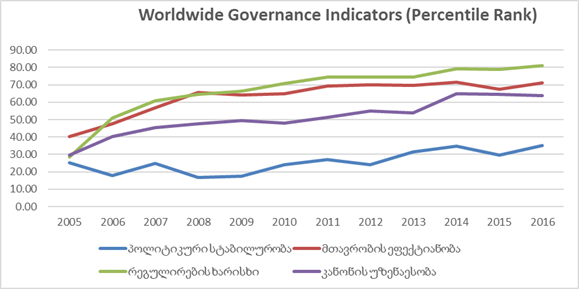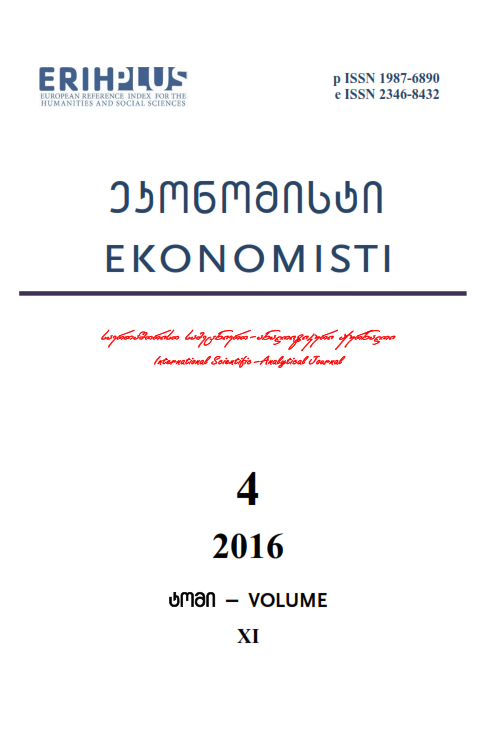
The international scientific and analytical, reviewed, printing and electronic journal of Paata Gugushvili Institute of Economics of Ivane Javakhishvili Tbilisi State University

Georgian Institutional Environment Assessment by WGI Indicators and its Impact on Economic Growth
The decline of Eastern European and socialist countries of the former Soviet Union and transformation of centrally planned farming into market economy in new states that were based on their territories has been a major influence in the history of modern world economics at the end of the 20th century.
There is some interdependence between economic developments and processes in the economies of any country. One of the fundamental relationships in the economies of countries with transformation economies is the link between institutions, which are operating in the country, and economic growth. Regarding this issue, even though the importance of the problem is high, a common approach to institutions’ and economic growth problems is not yet formulated.
Worldwide governance indicators estimate the quality of governance of more than 200 countries around the world. The assessment is given as absolute value and rating. Absolute assessment refers to the situation of an individual country taken separately and gives an opportunity to assess how the country's main indicators are changing in time according to each of the criteria. The percentile rating reflects the results of the specific country in comparison to the rest of the countries.
Worldwide Governance Indicators (Percentile Rank)[1]
Table 1
|
Year |
Political Stability |
Government Efficiency |
Rate of Regulation |
Supremacy of Law |
|
2005 |
25.24 |
40.20 |
28.43 |
29.67 |
|
2006 |
17.87 |
47.80 |
50.98 |
40.19 |
|
2007 |
24.64 |
56.80 |
60.68 |
45.45 |
|
2008 |
16.83 |
65.53 |
64.56 |
47.60 |
|
2009 |
17.54 |
64.11 |
66.51 |
49.29 |
|
2010 |
24.17 |
65.07 |
70.81 |
47.87 |
|
2011 |
27.01 |
69.19 |
74.41 |
51.17 |
|
2012 |
24.17 |
70.14 |
74.41 |
54.93 |
|
2013 |
31.28 |
69.67 |
74.41 |
53.99 |
|
2014 |
34.76 |
71.63 |
79.33 |
64.90 |
|
2015 |
29.52 |
67.31 |
78.85 |
64.42 |
|
2016 |
35.24 |
71.15 |
81.25 |
63.94 |
Figure 1

We are planning to study the impact of Worldwide Governance Indicators on economic growth (four indicators) within the research. Observation data is provided in Table 1. Observation includes four factors and consists of twelve units of observation.
Worldwide Governance Indicators[2] and the GDP[3]
Table 2
|
Year |
GDP |
Political Stability |
Government Efficiency |
Rate of Regulation |
Supremacy of Law |
|
2005 |
11,621 |
-0.75 |
-0.43 |
-0.60 |
-0.71 |
|
2006 |
13,790 |
-0.96 |
-0.24 |
-0.14 |
-0.46 |
|
2007 |
16,994 |
-0.64 |
0.11 |
0.29 |
-0.35 |
|
2008 |
19,075 |
-0.92 |
0.30 |
0.48 |
-0.27 |
|
2009 |
17,986 |
-0.97 |
0.29 |
0.50 |
-0.20 |
|
2010 |
20,743 |
-0.72 |
0.31 |
0.59 |
-0.21 |
|
2011 |
24,344 |
-0.66 |
0.55 |
0.66 |
-0.12 |
|
2012 |
26,167 |
-0.68 |
0.61 |
0.69 |
-0.01 |
|
2013 |
26,847 |
-0.44 |
0.59 |
0.76 |
-0.01 |
|
2014 |
29,152 |
-0.32 |
0.49 |
0.93 |
0.19 |
|
2015 |
31,756 |
-0.47 |
0.40 |
0.92 |
0.27 |
|
2016 |
34,028 |
-0.29 |
0.51 |
1.01 |
0.37 |
The model used in this paper is presented below:
![]()
And the estimation for each of the individual models:
![]()
On the basis of linear regressive analysis, we can observe, how the dependent variable will change if the x factor (Worldwide Governance Indicator) is changed by one unit. We have studied the influence of four Worldwide Governance Indicators on economic growth. These indicators are: political stability, government efficiency, rate of regulation and supremacy of law. The improvement of these indicators has been observed since 2010, but 2015 resulted in a slight deterioration. Indicators improved once again in 2016. If the improving trend of indicators is maintained, this will have a positive impact on economic growth. Based on the Excel software and the evaluation of the significance of regression coefficients, the following conclusions can be made:
In most cases, it is not necessary to implement universal and comprehensive reforms of institutions. The reform strategy must be concentrated on selecting key institutional organizations.
The import of institutions should take into account local conditions. This is a crucial for successful transplantation of institutions. Particular attention should be paid to the strengthening of institutions that are responsible for economic sustainability and reduce economic shocks.
Modern empirical studies show that countries that have more developed institutions are more sustainable against foreign shocks. The results show that countries with effective institutions and the unity of the community can more effectively deal with shocks and implement an effective anti-crisis strategy and vice versa, underdeveloped institutions and internal social conflicts complicate overcome the economic crisis.
The degree of quality of institutions, significantly determines the differences between the economic growth rates compared to other factors. Within such approach, investments represent transmission mechanism linking institutional factors and economic growth.
Despite the increase of individual macroeconomic indicators, the transformation of institutional sector was not achieved, which led to the inefficiency of public entities. Georgian economy become deeply dependent on the foreign sector. It should also be noted that in the 1990s, agrarian sector had a great impact compared to other sectors in mitigating negative social conditions.
The main criterion of economic efficiency assessment was to improve basic macroeconomic parameters. On the other hand, the country's economic policy envisaged privatization, deregulation of several sectors of economy, tax liberalization, liberalization of foreign trade and liberalization of labor legislation.
[1]http://info.worldbank.org/governance/wgi/index.aspx#home
[2]http://info.worldbank.org/governance/wgi/index.aspx#home
[3]https://mof.ge/mshp_ekonomikuri_zrda
